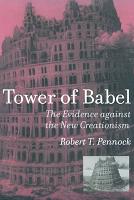Who also happens to be in the business of making his living attacking I.D. folks and evangelizing secular humanism under the radar:

Now if he's making good money at it ... well. He can't be all bad, right?
Btw, here are some revealing comments about his book, including some of his own remarks:
Evolution as a Worldview:
Pennock’s arguments for naturalistic evolution reveal its metaphysical nature. When a theory becomes paradigmatic, it explains everything but looses its tentativeness. This, even according to Pennock, is ground for dismissal as a scientific theory:
"Of course Popper was correct that science should rule out all-purpose "explanations" (this is just one of the reasons, as we shall see in chapter 6, that science does not consider the Creation hypothesis), but he was wrong to have thought that Darwinism fell prey to this problem" (100). Yet, previously Pennock was praising evolution’s ubiquitous explanatory power:
We should thus think of scientists not as simply using a collection bucket, but as using a flashlight. One tests a hypothesis as one tests a flashlight - by turning it on and seeing whether and how well it can illuminate one’s surroundings…. Particularly powerful theories are like searchlights that shed a broad, bright, and sharply focused beam upon the world, allowing us to clearly see and distinguish its features. Evolutionary theory is such a searchlight…. It is the great explanatory power of evolutionary theory - that it accounts for so much data so well - that testifies to its truth (54).
But notice that a truly scientific theory, such as say, the law of gravity, does not have universal applicability to virtually every subject one can talk about. We do not explain macroeconomics with Einstein’s theory of relativity. Yet throughout The Tower of Babel, Pennock illuminates everything from cosmology, to biology, law, language and even creationism with the search-beam of evolutionary theory. This reveals its Weltanschauung rather than scientific nature.
and this, very interestingly, about morality:
Pennock’s Ethics:
Pennock insists that morality has a positive basis whether or not God exists. His explanation of why this is true, however, falls between two stools. First, he tells us that people do find meaning in their lives, apart from whether or not they believe in God. For instance they might find worth and meaning in their children, or in their work, or in building a new home.
Then he simply acknowledges that this is not a solid basis for morality and worth, for we might "expect more." Beyond mere "feeling of value," we may want "values that are justified"(329). One wonders just what point the example was making.
He states, "On this point the philosopher and the creationist can agree - by itself the simple identification of individual psychological value does nothing to justify those values. We would not want to fall into a form of subjective relativism, which is antithetical to the most basic meaning of morality" (329).
In what seems like an attempt to mask the desperation of his case, he tells us that there is a vast history of ethical theory justifying morality and values apart from God’s existence (what that body of thought actually says on the subject he leaves out). The issue is so simple though that he sees the need to only "briefly note one solution to the (creationist’s) existential crisis." The solution? Existentialism itself. Pennock elaborates:
According to the existentialist, we are right to feel worried about meaninglessness because the world really is meaningless. We are moral beings in an amoral world, so it is quite understandable that, thrown into such an absurd situation, we might wonder whether life is worth living. Nevertheless, let us not give in to despair … for as moral beings we have the freedom to interpret the world as we will, and thereby to impart meaning to life.
If we are not given a purpose, we can generate our own purposes.
We can thumb our noses at meaningless and rise above the amoral contingencies of the world, creating value as we go, by the choices we make and the actions we take. This is a philosophy that challenges us to be masters of our own fate and to carry on in the face of hopelessness" (330).
To summarize: The angst that creationists feel results from their perceived need to ground their existence in God’s existence. But this is really unnecessary. There is abundant meaning in a universe without God. On the one hand, we can ground our significance in the baseless feelings of purpose we have in our relationships, our material things, and our occupations. Or, we can just set our jaw, accept the real meaninglessness of our existence, and then conjure up our own meaning. Well, perhaps some of us may be forgiven if we still "expect more."
from http://www.ideacenter.org/contentmgr/showdetails.php/id/1128 "Conjure up our own meaning" - indeed.
That is really what Pennock is up to, a secular humanist evangleist posing as an 'unbaised' "scientist" in a Pennsylvannia courtroom.
Someone needs to call the lawyers for the school board, have them read this post, then cross examine the thoughtful, fair, unbaised, non-leftist Dr. Robert - and ask him why he makes his living denying God.
I bet his Dad badly mistreated him when he was a vulnerable kid.